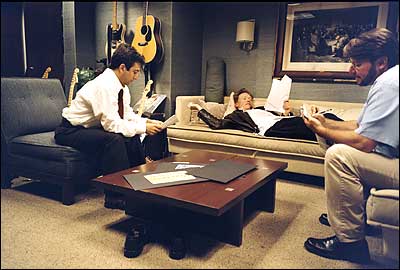 |
Conan O'Brien in his dressing room with producers Frank Smiley, left, and Daniel Ferguson.
(Photo: Jake Chessum) |
The clock is striking midnight at Rockefeller Center. On Central Park West, Conan O’Brien’s 2-year-old daughter and his wife, pregnant with a boy, are fast asleep. O’Brien, 42, is dressed in an NBC security guard’s uniform with an extra-large hat on his extra-large head, stalking the hallways trailed by two cameramen. “He’s wide, I’m tight,” one reminds him. “Figured that,” says O’Brien with a lightning-fast smile, there for the second something is funny and otherwise hard to find.
The hours-long night of videotaping, during which O’Brien, strangely, remains in character as the Red Fox, has already included a search for the ghost of Al Roker and the robot soul of Stone Phillips, a shriek of “Defcon Level Nine, we’ve just seen a giant squid! Avast, avast!” and the demand that a bystander hand over his camera: “This is New York City,” scolds O’Brien. “Never give someone your camera.” He tells a half-dozen tourists to squat on the neutral-colored tile of the Rock Center lobby checkerboard with their hands over their heads while chanting “Whee, I’m a top,” and asks, “What is wrong with you people? Have you no dignity?” Then he pushes open the revolving door of the midtown Art Deco masterpiece where television was born and enters the humid city night.
A glimmering blonde rolls down the window of her BMW and yells, “I love you, Conan!”
In the blink of an eye, a gape-mouthed mob of 50 forms behind O’Brien as he dashes to and fro on 49th Street—a visible show of the raw power of the late-night talk-show host, a job in which everything that happens in a whole hour of television is thought to be an extension of you and in your complete control. Frisky, he jumps onto a pedicab for a few pedal-strokes, flags down a horse-and-buggy, then climbs onto a passing city bus, its doors wheezing open in the middle of the block—“Bus looks good,” he pronounces from the top of its stairs. On the street, he points into the crowd: “Virginia, I want you home in five minutes!” he tells one woman. “But I’m from Turkey,” she says.
The mob waits expectantly for the next antic. “Please disperse!” says O’Brien. “There’s nothing for you to see here. Return immediately to your loved ones.”
Then O’Brien pulls out one of his signature shticks.
“My show,” he says, with something in between a laugh and a sneer, “is on way too late for any of you to care.”
O’Brien, who is optimistic and fatalistic in maddeningly equal proportions and provides few clues to which way he will swing at any given moment, has been buoyed and in some ways consoled by this 12:30 a.m. fail-safe for the past thirteen years: Late Night With Conan O’Brien is on too late, no one is watching, the show is not a monument in popular culture. O’Brien’s show has consistently drawn an average of 2.5 million viewers per night for the past nine years, and unlike Letterman’s (4.5 million) or Leno’s (5.6 million), the numbers rarely change according to the strength of A-list guests or the quality of 10 p.m. network drama and local news. He has expanded on Letterman-pioneered meta-show devices in which the camera becomes a prop—O’Brien is perhaps the only talk-show host to lick the camera—and added to this a Pee-wee’s Playhouse–on–crack sensibility where O’Brien, as the world’s tallest leprechaun, presides over and participates in oddball sketches that keep the fourth wall intact (e.g., O’Brien as the Red Fox). This is part of what New York excels at these days, smart sketch comedy as seen on Saturday Night Live or at the Upright Citizens Brigade. It is perhaps also part of what has given New York a bad name in comedy in the rest of the nation, which ranked the East Coast the least-funny region of the U.S. in an August poll by the Kaplan Thaler Group (the South came in first).
“Have these people been to Salt Lake City recently? Have them go to Salt Lake City and order a lobster and see how funny that is,” says O’Brien. “New York is a social experiment—the results aren’t in yet, it may not have worked, they took way too many people with a large disparity of wealth, stacked them on top of each other, and sprinkled bagels over the whole thing. Contrast breeds comedy, and the more extreme the contrast, the better the comedy.”
The wit and wisdom of Conan O’Brien: “The federal government asked people not to return to New Orleans because it’s still not safe. Then the federal government said the same thing to the people of Detroit, Cleveland, and Newark.”
In four years, O’Brien will no longer enjoy the pathology of 12:30—“Do you love me? Well, I don’t care if you don’t, because I’m on at 12:30.” In one of the great anticlimaxes in recent late-show history, certainly as compared with the epic saga of the Mike Ovitz–negotiating, Warren Littlefield–bumbling, and Jay Leno–closet–eavesdropping of the Leno-Letterman tussle over the Tonight Show chair in the early nineties, it was announced one year ago that O’Brien would succeed Leno in 2009. With about a year left on his contract, O’Brien was receiving overtures from ABC, and signaled in the press that he was ready to move on. After that, NBC moved quickly. (O’Brien had previously ignored feelers from CBS when Letterman’s contract was renegotiated in 2002, and turned down a reported $25 million offer from Fox at the same time.)